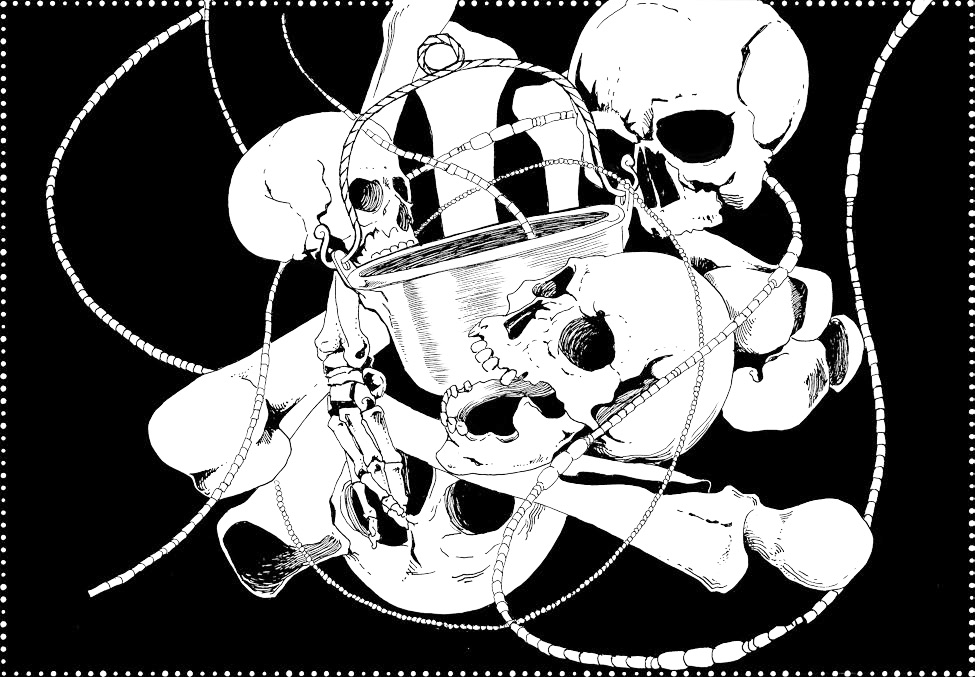I came across Campaign Games’ Forts & Frontiers quickstart “The Feast of the Dead” browsing the box of options for Free RPG Day this year, but ended up going home with something else and somewhat regretted it— Forts & Frontiers was something new and different over the familiar skeleton of 5E, so I was excited when they announced they were putting it up for free at DriveThroughRPG and followed up with a kickstarter campaign that kicked off this last week.
My initial thoughts are pretty much based on a first read at the airport and a few brief interactions on with them on Twitter, so when I finally get a chance to try this at a table, I’ll be sure to follow up here as well.
The PDF and booklet both have an old-school RPG feel, the cover format evoking old TSR modules like “The Keep on the Borderlands”, and the original artwork throughout is fantastic and expressive— I especially love the Wendigo encounter. The featured image above is from the quickstart— it and the rest of the illustrations are by Stephen W. Gurtowski.
The RPG drops us into 17th/18th century North America built on the D&D 5E SRD, with European settlers expanding through and exploring the new world, and the existing nations they encounter along the way. This quickstart is set in 17th century Wendake (present-day Ontario).
Since it’s designed on top of 5E, on-boarding is quick and easy, with a couple pages of history/background and a page or so of new content and rules adjustments before we dive into the adventure.
The rules adjustments are lightweight— Firearms take an an extra action to load, black powder an additional action on top of that. Archery ammunition is also more limited, and takes a survival check (with degrees of success) to recover. I am definitely all-in on the choice to use the Dungeon Master’s Guide’s realistic rest times— 8 hour for a short rest, 7 days for a long rest. D&D’s fantasy magic does not exist per say, but some kind of magic/faith/medicine is used by the Jesuts and some of the Wendat. Three of the PCs have minor spell casting abilities (“prayers/rituals” using a couple of D&D’s cleric spells), with no spell slots, but recovered on a short/long rest.
The pre-generated characters are (almost) all part of the same Wendat tribe, and the module suggests which of the six could/should be run as NPCs if you play with four or five of the six possible PCs.
One new mechanic introduced is a character’s Belief, which reads (in part),
When an extraordinary event occurs, for example a European priest heals someone by laying on hands or a creature of North Ameri- can legend is encountered in the wilderness, players must make a Wisdom saving throw with the DC set by the magnitude of the event. On failure, their characters gain a point of belief. The more belief points characters have, the more disposed they are toward the influencing civilization.
page 3
I’m onboard with the concept of it, but it’s not immediately clear how mechanical use of it works as it increases, it just is. If a failed wisdom save increases one’s belief, it would seem the higher-wisdom characters would be less accepting/“believing” than others? It’s only in the context of the adventure (in fact, the second-to-last page), that it’s explained belief points are a pool to be spent— In this adventure, they can be added to a persuasion role trying to convince a shaman to allow Anatole Berger, the Jesuit priest, to assist in helping a sick man, but they also have the possibility to hinder rolls— We’ll get to that below.
The Adventure
The Portage & The Hunt

I don’t love kicking off the adventure with “Roll of Exhaustion”. I’ve encountered this with a couple Adventurer’s League modules before, and it can make the session rather frustrating. This story starts with two back-to-back, one for the journey “up to this point” (they’ve been traveling for about six weeks), and another as the party attempts a portage around rapids— the first task of the game. Spending the entire rest of the adventure rolling all your checks at disadvantage is no fun, exhaustion is an unforgiving mechanic even in full-flavor D&D, and with limited healing/recovery (and seven-day long rests!), I can’t imagine it’s going to be any less debilitating in 17th-century North America. I would definitely drop one, and maybe drop both of the exhaustion checks at the top of the session. I’ll have to think on what other consequences (if any) to use instead.
The check for this portage is also a bit vague. It notes the DC depends on how many people are helping with each boat, but it’s unclear the cost of either choice— they are a party of two boats for six people (originally four, but the original trading party has picked up two more, Anatole, the Jesuit, and Yahounk, another Wendat), why would two of the party not be helping? As GM I’d try to offer up alternative options for what two of the party might do instead of carrying— are they scouting (thereby giving advantage to everyone else making their rolls for the portage)? Getting a head-start on hunting/foraging (which is the next encounter, and oh look, another chance for exhaustion!).
Downtime and Storytelling!
I love campfire downtime and the chance to spur on conversation and roleplaying between party members. The module includes a short Wendat creation myth, and suggest giving the handout to one of the players to share the story with everyone else (and most importantly, their Catholic companion).
A couple days of camp time to rest and prep food from hunting/foraging also lets us see the belief mechanic in action, although once again, it’s there, but it’s unclear how to use it until later.
A Monster, More Travel, More Exhaustion
The Wendigo encounter should be fun, dialing up the creepy factor with a player character who thinks he hears his family’s voices. More travel rolls on the part of the guide means more possibilities for Exhaustion CON saves, putting us at the fourth or fifth check for some of these characters and (if their not rolling well) getting into the truly debilitating stuff. There is a note to roll for random encounters in the event they need to repair a canoe at one point, but I didn’t see any kind of encounter table to use.
Finale & Using Belief Points
We get to the last act of the encounter and get to see these belief points in use, but I’m still a little fuzzy on it all. The points can be pooled to help in persuading a shaman to allow Fr. Berger to help a sick man (and specifically call out “points gained through interaction with Anatole Berger”), but also, in the event the shaman tries to stop Berger, belief points Berger gained from interacting with the Wendat are subtracted from Berger’s roll.
Wrapping up with a strong social encounter (with the possibility of combat) gives us a satisfying ending, and one of my favorite parts of running a one-shot/quickstart— There are no personal stakes for the player and their PC, so they can be just as satisfied with drastic action, death, and/or any other failure. They’re likely never going to play this character again, and they may have become emotionally invested in the last couple hours of gameplay, but killing, banishing, or capturing a PC carries none of the baggage that it might in an ongoing campaign. Instead you and each player can give a quick one or two sentence epilogue— ask them what is is that happens, and just like that, it does.
Final thoughts, quick notes and open questions
- Belief— My initial understanding was Belief was something that would grow over time/encounters and build, but once I got into the adventure understood it to be more of a pool to spend and regain again. I find myself trying to draw half-baked parallels to the Sanity and Mythos skills in Call of Cthulhu, but it’s not quite right. As noted above, it seems to sometimes help, sometimes hinder. Does one want belief in all cases? I would think the increase in cross-cultural belief and understanding should be a good thing, if it denotes a grown in one’s knowledge and acceptance of the “other’s” culture, but it also gets in the way of Fr. Anatole’s ability to heal someone.
- Degrees of Success. After picking up Expanse AGE I’ve tried to work on ways to incorporate degrees of success and “failing forward” in my 5E games (something Call of Cthulhu also handles well with its “pushed” rolls). Most/all of the checks described in the scenario include details on what to do with a critical success/failure, a failure of five or more, or multiple DCs (for example, recovering one spent arrow after a fight is a DC11 survival check, recovering all of them DC16).
- The adventure does a great job of checking the quickstart boxes (this is an exploration heavy game! Here’s an example of combat! Oh look, the supernatural is at least a little bit real! Here’s a social encounter, see our new belief mechanic in action!), but does expect an understanding of 5E’s basic rules and mechanics, with little hand-holding beyond pointing to the SRD or Player’s Handbook).
- Be careful with that exhaustion! I could be being overcautious about how this would actually play out (and indeed, having travelled by canoe in Canada for two weeks, I can imagine traveling by canoe for two months would be rather exhausting), but I’m a little afraid of how a number of failed CON saves will stack up— With a long rest unlikely in the course of the adventure, the party could be only a few unlucky rolls away from To Build a Fire.
I have a feeling much of vagueness or questions I encountered will be addressed by the fleshed-out version coming from the Kickstarter, and I’m interested to see how the nationality-based “race” replacement will work for character creation, as well as more details on how the classes are defined— Between the six PCs, we have two flavors of cleric (priest), and one fighter (warbearer). Check out the kickstarter for the rest of the month, and I hope to followup with a reflection on actual play before the end of the summer.

